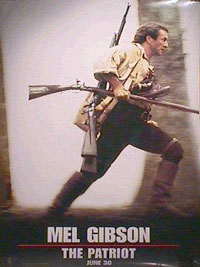The Patriot《爱国者》(精讲之二)
[ 2007-03-22 16:46 ]

影片对白 He was in the flank. All
around us. Amongst us. I could barely see him. He was there, then he was
gone.
电影故事 The
Patriot 《爱国者》所获奖项
考考你
现学现卖
4. Regular
Regular
这里的意思不适是“常规的,定期的”,而是作为名词来用,意思是“正规兵,职业军人”,相对于militia(民兵)而言;它的复数regulars表示“正规军队”。
此外,regular做名词还可以表示“修士,修女”,"(政党的)中间分子,忠诚党员"。
5. Die a ... death
和live a ... life类似,die a ... death 表示的是"死的方式",例如:The private died a
hero's death.
此外,die a death 表示“失败,结束”,例如:The principle of free health care for everyone is
likely to die a death in the next ten years.
文化面面观
The Patriot: Historical
inaccuracies & controversies
 The film has been heavily criticized for its
historical inaccuracies, including the invention or exaggeration of British
atrocities. Most criticized was a scene depicting the torching of a church
containing a town's inhabitants. This scene alone is outrageous considering the
notoriety the Boston Massacre, which killed only a handful of colonists. Even
supportable atrocities, such as the killing of prisoners are inaccurately
depicted, with redcoats sending roving firing squads to dispatch the wounded. In
such instances however, the British were known for simply using the bayonet, as
powder use in the field had to be controlled due to regular resupply
difficulties. Also in the film, Martin justifies the described atrocities
against the Cherokee in the French and Indian War by stating that the Cherokee
broke their treaty with the French. Although at war with the colonies of
Carolina and Virginia, the Cherokee never formally allied themselves with the
French. Although it went generally unnoticed by casual audiences, historians
also criticized the depiction of American-owned slaves being freed to serve in
the Continental Army. It was actually the Dunmore Proclamation made by the
British Army which first announced conditional freedom to slaves who joined
them, a fact which is acknowledged by the film when Colonel Tavington tells
blacks working for Martin that slaves who fight for "The Crown" will be granted
their freedom upon an English victory. The new American government would
maintain legalized chattel slavery until the Thirteenth Amendment was ratified
in 1865. Although it is true that Blacks fought on both sides in the Revolution,
the South Carolina assembly resolutely refused to allow blacks - either slave or
free - into the state militia, contrary to what one sees in this film. Here
Martin is no slaveholder, but a farmer who employs black workers for a salary, a
labor relationship that was very rare in colonial South Carolina. There are also
characters that are historically misplaced, such as the inclusion of British
General Cornwallis at the final battle, which is allegedly based on the Battle
of Cowpens. Even then, the time of year is wrong, and the numbers of troops and
artillery greatly exaggerated. Benjamin Martin is a combination of Thomas
Sumter, Andrew Pickens, Brig. Gen. Francis "Swamp Fox" Marion and Col. Daniel
Morgan, whose strategy for the Battle of Cowpens Emmerich imitates in the
climax. Col. William Tavington is based on General Sir Banastre "Bloody Banny"
Tarleton. The film has been heavily criticized for its
historical inaccuracies, including the invention or exaggeration of British
atrocities. Most criticized was a scene depicting the torching of a church
containing a town's inhabitants. This scene alone is outrageous considering the
notoriety the Boston Massacre, which killed only a handful of colonists. Even
supportable atrocities, such as the killing of prisoners are inaccurately
depicted, with redcoats sending roving firing squads to dispatch the wounded. In
such instances however, the British were known for simply using the bayonet, as
powder use in the field had to be controlled due to regular resupply
difficulties. Also in the film, Martin justifies the described atrocities
against the Cherokee in the French and Indian War by stating that the Cherokee
broke their treaty with the French. Although at war with the colonies of
Carolina and Virginia, the Cherokee never formally allied themselves with the
French. Although it went generally unnoticed by casual audiences, historians
also criticized the depiction of American-owned slaves being freed to serve in
the Continental Army. It was actually the Dunmore Proclamation made by the
British Army which first announced conditional freedom to slaves who joined
them, a fact which is acknowledged by the film when Colonel Tavington tells
blacks working for Martin that slaves who fight for "The Crown" will be granted
their freedom upon an English victory. The new American government would
maintain legalized chattel slavery until the Thirteenth Amendment was ratified
in 1865. Although it is true that Blacks fought on both sides in the Revolution,
the South Carolina assembly resolutely refused to allow blacks - either slave or
free - into the state militia, contrary to what one sees in this film. Here
Martin is no slaveholder, but a farmer who employs black workers for a salary, a
labor relationship that was very rare in colonial South Carolina. There are also
characters that are historically misplaced, such as the inclusion of British
General Cornwallis at the final battle, which is allegedly based on the Battle
of Cowpens. Even then, the time of year is wrong, and the numbers of troops and
artillery greatly exaggerated. Benjamin Martin is a combination of Thomas
Sumter, Andrew Pickens, Brig. Gen. Francis "Swamp Fox" Marion and Col. Daniel
Morgan, whose strategy for the Battle of Cowpens Emmerich imitates in the
climax. Col. William Tavington is based on General Sir Banastre "Bloody Banny"
Tarleton.
|